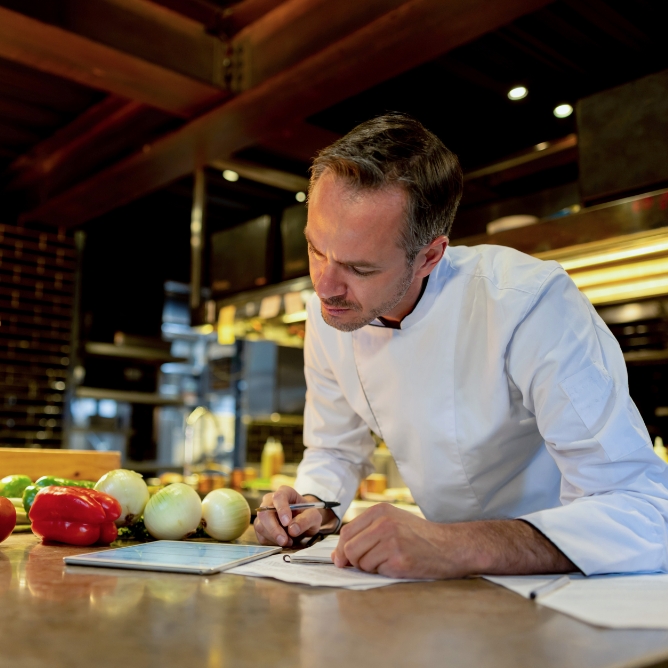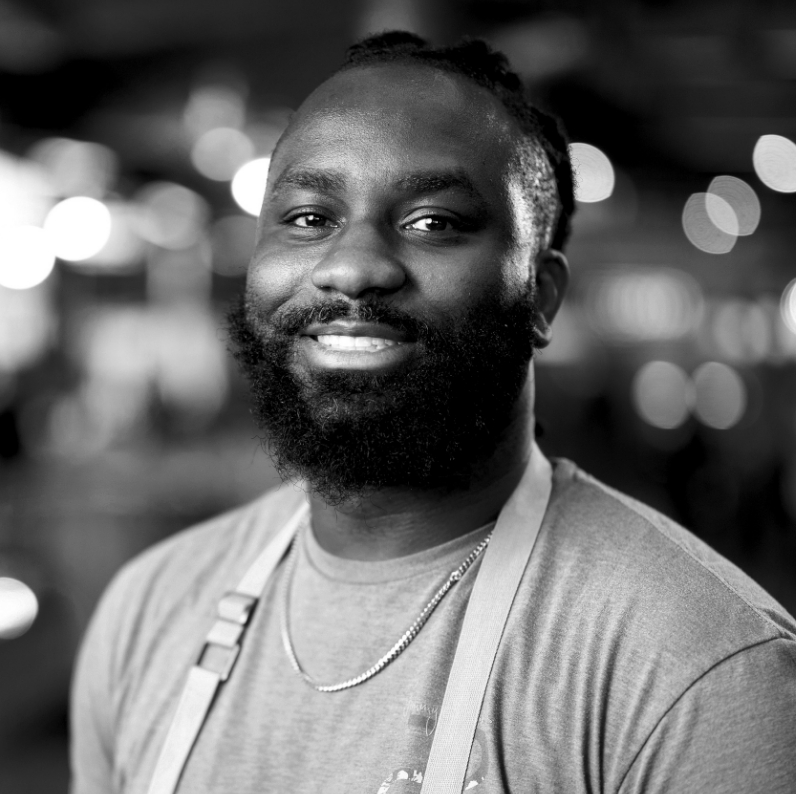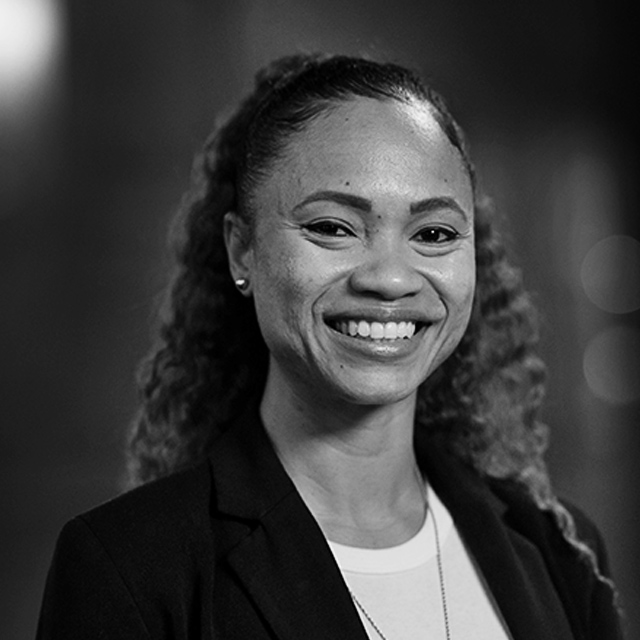Tie Whittaker
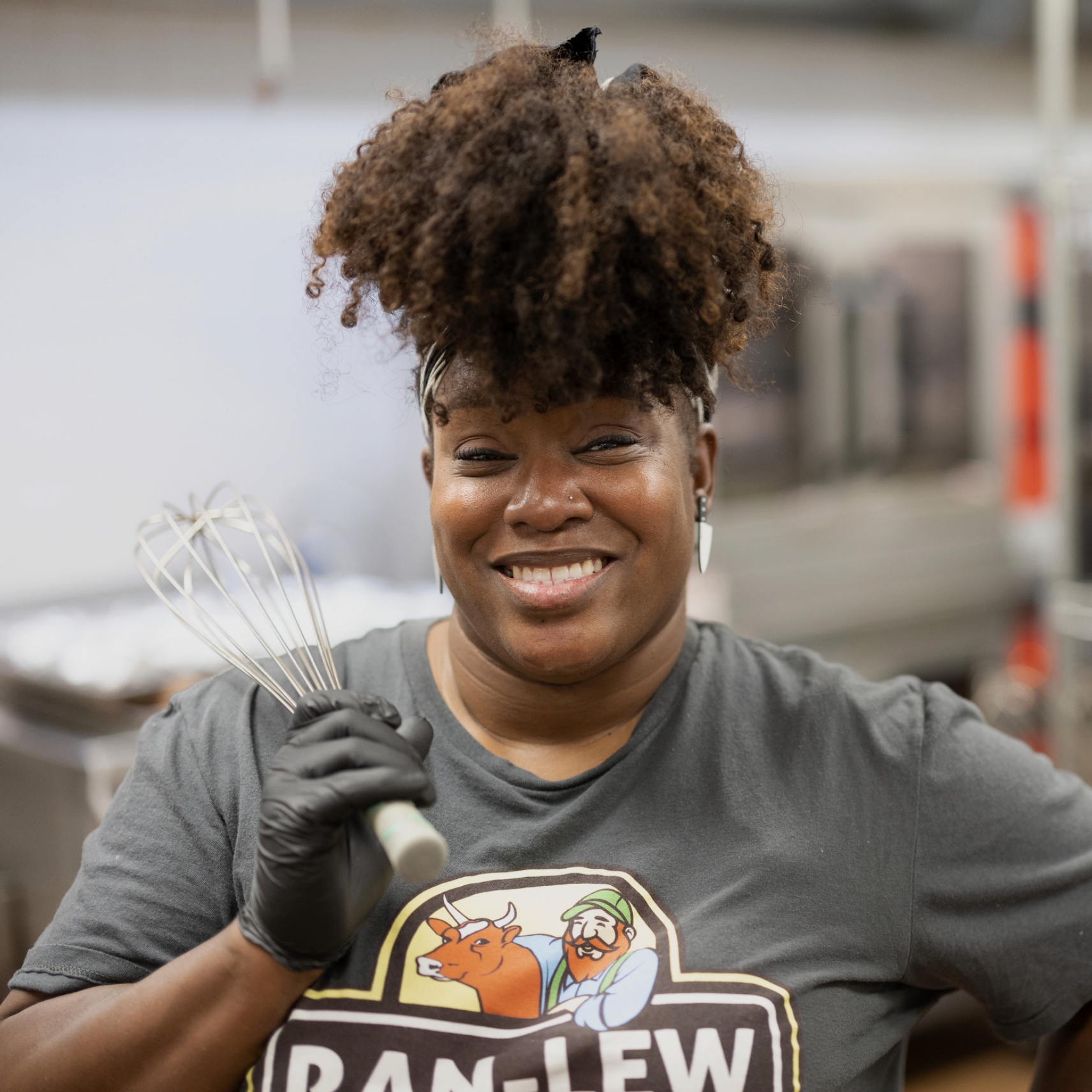
owner,
Buttermilk Boutique
Whittaker’s career path
- Pastry Cook
- Pastry Sous Chef
- Pastry Chef
- Pastry Instructor
- Executive Pastry Chef
- Owner
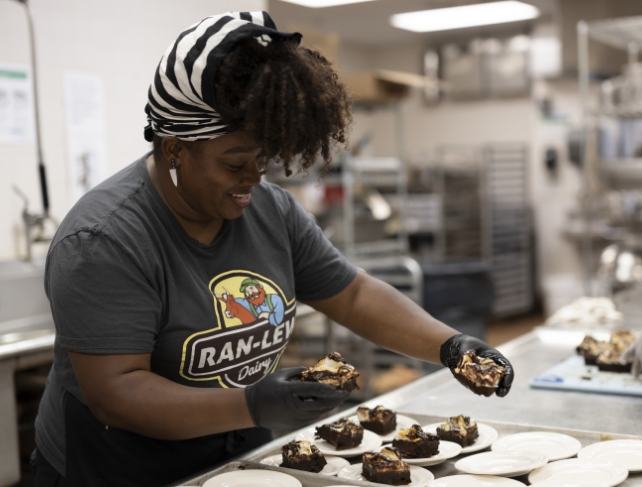
Beyond the Batter: Tie Whittaker’s Ode to Family
Her boutique bakery business is crafted with her grandmother’s recipes and fond childhood memories of them baking together.
Tie Whittaker realized early on that a slice of her grandmother’s homemade buttermilk pie had the power to heal the soul and nourish the body. And that’s what led her to become a pastry chef.
Her maternal grandmother’s way of ministering was to visit church members who were sick or shut in and give them a homemade pie or cake. Whittaker, who was her grandmother’s shadow in the kitchen, recalls that some of those they visited were moved to tears.
“We not only delivered the pie, but we’d sit with them. We might eat with them. We might pray with them,” Whittaker recalls. “And that just helps someone keep hope alive.”
Years later, Whittaker returned to her grandmother’s kitchen. Her grandmother wanted to start a pie company.
“It was just her and I, with me transforming those scant cups or sprinkles of this or sprinkles of that into weighted recipes that could be duplicated if we were going to start a pie shop,” Whittaker recalls.
They didn’t know it at the time, but cancer would take her maternal grandmother’s life soon afterward. Their time together prompted Whittaker to pick up her grandmother’s dream and make it her own through Buttermilk Boutique.
“Angel’s Pies didn’t get to happen, but Buttermilk Boutique was an ode to her,” Whittaker says. “Boutique because of the different kind of specialty treats that she would make for us. Buttermilk because buttermilk pie was one of the most famous pies that she would make for church, so it’s what started her idea for the company.”
Grandma’s house was the place to be
Grandma’s house was the place to be growing up, says Whittaker.
“She baked from scratch, everything from pizza dough to cookies and pies and things like that,” she says. “I grew up watching and licking the beaters from the mixer and helping,” says Whittaker.
They harvested fresh fruit from trees in the backyard, which was used in many of their desserts.
“She made picking peaches and peeling hundreds of them fun,” Whittaker says of her grandmother. “We had races and things like that. I was always wanting to be up under her, helping her mix and things like that. It made me feel like a grown-up.”
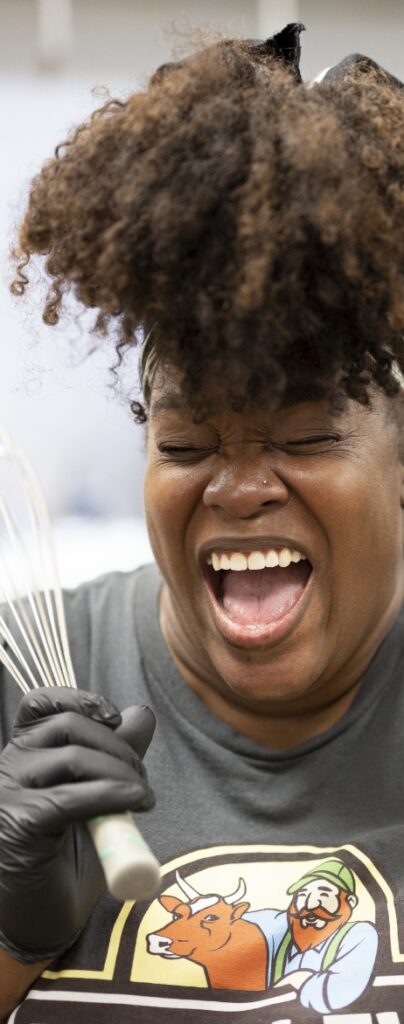
Formal training and moxie
Although Whittaker’s passion for cooking escalated through high school, her father encouraged her to consider earning a law degree for its financial benefits.
“I baked my way through the LSAT because I didn’t know what I was doing,” Whittaker says. After her second attempt with the exam, she returned to her comfort zone: the kitchen. And she abandoned law school.
She found a graduate-level gastronomy program at Boston University that didn’t require kitchen experience, so she enrolled in it.
“It was probably the best thing I ever did,” she says.
While there, she started combing through her great-grandmother’s recipe collection, some of which included old magazine clippings from the ’50s and ’60s. It was there that Whittaker became known for her pies.
“Pies weren’t my thing. I can make them, but they’re not my first love,” she says. “But that’s what started it. I brought a buttermilk pie to class, and everybody was like, ‘Box it up now. Sell it.’”
Whittaker started making more things from her grandmother’s recipe book—and tweaking them.
“As I was working in these different bakeries and restaurants, helping with their pastry, it gave me moxie, the courage to use those recipes and try and transform them into something more modern.”
After the program, Whittaker moved to the Raleigh area to help take care of her paternal grandmother, who was diagnosed with breast cancer. She also nailed her first fine pastry job at Carolina Country Club. She learned so much there, from tempering chocolate to preparing for banquets with hundreds of guests. She learned the structure, timing, and organization needed to execute large-scale fine dining.
Those lessons inform how she operates today as the head pastry chef at Brookdale Senior Living and as the chef/owner of Buttermilk Boutique.
An ode to family
The NCRLA’s Chef Showdown competition in 2019 is where Whittaker demonstrated that she could take something as nostalgic as peach cobbler and elevate it into a modern expression of high-level gastronomy.
Her peach cobbler was a glossy peach that, when cracked open, exposed rich buttermilk cream, peach brandy, and fresh peach. The “dirt” it rested on was crumbled pie crust.
That creation—an ode to her maternal grandmother—earned her the People’s Choice Award that year.
In 2021, she became NCRLA’s Pastry Chef of the Year, with an ode to her father, who loves cigars and whiskey. She created a chocolate “cigar” filled with smoked chocolate mousse. A whiskey glass was filled with dark chocolate cake, caramelized cocoa nibs and whiskey ice cream. It was topped with a pecan miso lace cookie and a grilled peach sphere because her father likes peach bitters in his whiskey.
Whittaker’s culinary school, fine dining training, and family influence are the foundation of her own emerging pastry legacy.
When I stopped looking for acceptance in this kind of all-boys club and started doing my own thing, I think that’s when I became more confident and more free and more popular. There are a lot of French bakeries around. There isn’t a spotlight on Black women pastry chefs who are creating luxurious desserts that evoke nostalgia.
“A torte doesn’t always have to be French chocolate. It can be sweet potato, and it can be beautiful, and it can be delicious. Chocolate cake doesn’t always have to have a particular method. I can do it the way my grandmother did it and maybe change the filling and take it up a notch,” Whittaker says. “When I stopped looking for acceptance in this kind of all-boys club and started doing my own thing, I think that’s when I became more confident and more free and more popular. There are a lot of French bakeries around. There isn’t a spotlight on Black women pastry chefs who are creating luxurious desserts that evoke nostalgia.”
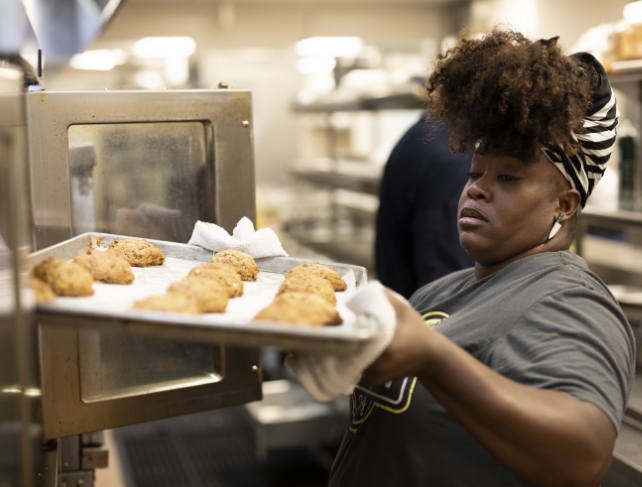
Pro tips Q&A
Whittaker discusses mentoring, networking, and inclusive kitchens. She also has some advice for rising pastry chefs.
On mentoring:
Q: What’s your role in shaping the next generation of pastry chefs?
A: I love social media because chefs are sharing, and they’re dropping gems and they’re helping other folks. I want to be approachable. I’ve learned that from a lot of Black chefs—we bounce ideas off each other. “Hey, did you know that this festival’s coming up? Did you want to apply? Do you want to do it together?” And so just trying to keep people in the loop, and being a friend really is what it comes down to. Be a nice person, be genuine, share your skills, and all that you pour into people will come back to you.
On networking:
Q: How important are events like the BayHaven Food & Wine Festival and Chow Chow Food + Culture Festival?
A: I think they’re important because they’re not just giving the culinary world like us chefs an avenue to share our background and to share the things that we love or the things that we’ve been working on, but it also gives people who are not in the culinary industry a look into the history or into the life of a chef.
I also think that when people see chefs of color coming together and it’s a very positive event, and it’s a very classy event, and it’s a very open event in the sense that anybody can come, but when you’re specifically highlighting people of color, it really gives them a chance to shine. It really gives people a chance to see what this group of people is about.
And then I think it gives the chefs, and the mixologists, and the pastry chefs a chance to really make some connections that they might not have otherwise made on their own, or that might’ve taken them longer. You meet all these other chefs from different parts of the world. You exchange numbers or you exchange Instagram handles, and now you’ve got a connection.
On inclusivity:
Q: How can industry professionals create more inclusive environments?
A: I think one of the biggest things, whoever you are, is respect. I think whether you’re a chef, or a dishwasher, or a waitress that you deserve respect.
If you respect that person, if you treat that person with respect, if you talk to that person like they’re a human being, you can get people to do what you need them to do. They’ll happily do what you need them to do when they feel respected and when they feel compensated. You have to respect people and compensate people. I think just those two things alone will go far.
On skills:
Q: What kind of skills do you need to be a pastry chef?
A: Discipline and practice. There were a lot of days where I went home after work to practice something that I might’ve messed up or something that I wanted to know more about. Also, taking a class to learn a new skill and stay relevant with trends can help you get to the next level.
I do that a lot. I’ve taught lots of up-and-coming chefs to bake, how to mass-produce things, how to properly store things. I’ve taught how I come up with different flavor profiles. You have to be willing to learn and practice.
If you dream it, put it on a plate and people will love it.
Q: What’s your advice to aspiring pastry chefs?
A: I think I’d like to say to my other pastry chefs out there, especially women, “Do all of the things that you dream about.” Every last one of my plated desserts has come from a dream. So, if you dream it, put it on a plate and people will love it.
Search for your next career move today.
browse jobs



